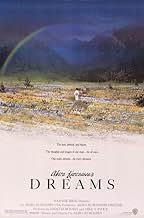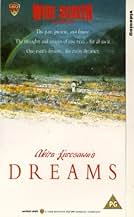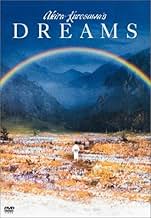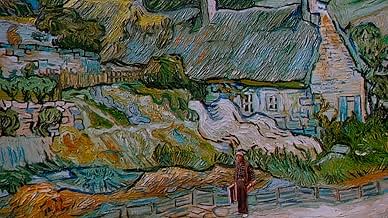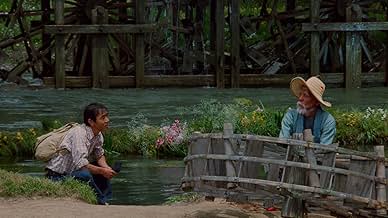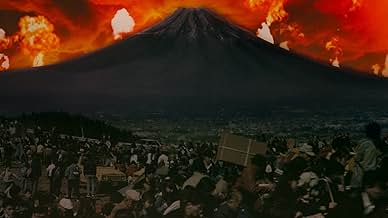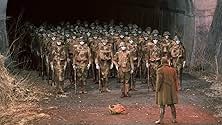- Prêmios
- 3 vitórias e 12 indicações no total
- Direção
- Roteiristas
- Elenco e equipe completos
- Produção, bilheteria e muito mais no IMDbPro
Avaliações em destaque
"Dreams" is one of the greatest puzzles to hit the screen since Tetris. If you're up for the challenge, you should definitely give it a try. Here Kurosawa presents us with 8 fragments which may seem confusing at first, but ultimately they tell a powerful story of man's evolution beginning at childhood in a traditional setting, taking us through adulthood, war and waste, to a postapocalyptic future that could be called "scifi", and ultimately capping the story with a stunning piece I won't ruin for you.
The story loosely follows a character called "I" as he grows up in his dreams. He is presented as merely an observer, almost like the faceless interviewer in "Citizen Kane," or for you literature fans he may remind you a lot of Dante in the epic "Divine Comedy". That is, he observes humankind through its sins. Aye, don't be fooled by Kurosawa's gorgeous, bright, uplifting visuals; this is perhaps Kurosawa's darkest tale.
The 8 stories are: 1) As a young child, he inadvertantly disrupts a secret ritual of foxes in the forest. 2) Still a child, he meets the ghosts of trees that his family destroyed. 3) Now a young adult, he is the leader of an ill-fated mountain expedition visited by a mysterious spirit. 4) Older yet, past the age of youthful fire, he is a soldier returning from a terrible war and haunted by ghosts of his battalion. 5) Now a middle aged artist, he encounters the ghost of Vincent Van Gogh. 6) Abruptly he finds himself in the middle of a (deliberately) insane disaster flick. 7) The scifi segment where he wakes up in a postapocalyptic future full of cannibal demons (yes, Kurosawa made a zombie flick). And ultimately 8) The one I won't mention because it's for you see how it all ends.
All 8 stories follow the same theme of "I" meeting ghosts who tell of man's sins. Worthy of note is our hero's passivity which is itself one of the failings of man. As "I" grows up and faces increasingly devastating consequences for humankind's shortsightendess, we realize Kurosawa's poignant message. Each "dream" is a stark warning.
If you watch this film, I suggest paying close attention to 1 subtle but important thing. Notice Kurosawa's use of "special effects" because that is the key to a deeper message. In the beginning when "I" is a child, the special effects (forest spirits) are merely people dressed up in elaborate masks--a very childlike way of perceiving fantasy. In the young adult segments, the special effects (ghosts of soldiers) are disturbingly realistic yet stylized. In middle age, the excellent Van Gogh segment, the special effects are magnificently overwhelming, literally engulfing the entire screen. Then for the 2 climactic "scifi" segments, suddenly the effects are almost absurd like a cheesy disaster flick (this was deliberate. Kurosawa even enlisted the assistance of his friend Ishiro Honda who directed a few Godzilla flicks). And we end on the 8th magical segment which has no special effects at all.
Kurosawa was telling us a story through the evolution of visuals, just as much as he was telling us a story of sequential events. If you can follow these and other clues that are peppered throughout, you'll realize that "Dreams" has a very clear path and a very cryptic but powerful story. So put down your sodoku; this is the real deal.
The story loosely follows a character called "I" as he grows up in his dreams. He is presented as merely an observer, almost like the faceless interviewer in "Citizen Kane," or for you literature fans he may remind you a lot of Dante in the epic "Divine Comedy". That is, he observes humankind through its sins. Aye, don't be fooled by Kurosawa's gorgeous, bright, uplifting visuals; this is perhaps Kurosawa's darkest tale.
The 8 stories are: 1) As a young child, he inadvertantly disrupts a secret ritual of foxes in the forest. 2) Still a child, he meets the ghosts of trees that his family destroyed. 3) Now a young adult, he is the leader of an ill-fated mountain expedition visited by a mysterious spirit. 4) Older yet, past the age of youthful fire, he is a soldier returning from a terrible war and haunted by ghosts of his battalion. 5) Now a middle aged artist, he encounters the ghost of Vincent Van Gogh. 6) Abruptly he finds himself in the middle of a (deliberately) insane disaster flick. 7) The scifi segment where he wakes up in a postapocalyptic future full of cannibal demons (yes, Kurosawa made a zombie flick). And ultimately 8) The one I won't mention because it's for you see how it all ends.
All 8 stories follow the same theme of "I" meeting ghosts who tell of man's sins. Worthy of note is our hero's passivity which is itself one of the failings of man. As "I" grows up and faces increasingly devastating consequences for humankind's shortsightendess, we realize Kurosawa's poignant message. Each "dream" is a stark warning.
If you watch this film, I suggest paying close attention to 1 subtle but important thing. Notice Kurosawa's use of "special effects" because that is the key to a deeper message. In the beginning when "I" is a child, the special effects (forest spirits) are merely people dressed up in elaborate masks--a very childlike way of perceiving fantasy. In the young adult segments, the special effects (ghosts of soldiers) are disturbingly realistic yet stylized. In middle age, the excellent Van Gogh segment, the special effects are magnificently overwhelming, literally engulfing the entire screen. Then for the 2 climactic "scifi" segments, suddenly the effects are almost absurd like a cheesy disaster flick (this was deliberate. Kurosawa even enlisted the assistance of his friend Ishiro Honda who directed a few Godzilla flicks). And we end on the 8th magical segment which has no special effects at all.
Kurosawa was telling us a story through the evolution of visuals, just as much as he was telling us a story of sequential events. If you can follow these and other clues that are peppered throughout, you'll realize that "Dreams" has a very clear path and a very cryptic but powerful story. So put down your sodoku; this is the real deal.
Most people dream but I wonder how many are rewarded with such beauty when their eyelids close and they drift into semi-consciousness. Kurosawa has collected some of his dreams and shares them with us. I don't ever remember seeing such vivid colours in my own dreams, but like Kurosawa's they are often fragmented and incomplete with a mystical quality involving spirits and the dead.
I like the peach tree scene where true repentance makes things right. Not only the peach blossom but also the kimono of the characters tiered up the hillside are most pleasing to the eye. As also is the meeting with van Gogh when his paintings with mad whirls of colour are brought to life and form part of the landscape.
Some dreams can be very frustrating when we are caught in a dangerous situation from which there is no ready means of escape. This is dramatically illustrated in the Mt. Fuji episode in which nuclear plants explode and a fog of coloured radio-active gases envelopes the characters. There is a strong message here about saving the environment. This message is also accented in the ogre scene and the peach tree scene and the water mill scene.
Some viewers might find the going slow at times. For example, the mountain climbers struggling in knee-deep snow seem to move at the rate of a few steps each minute and being encouraged by their leader to keep going as they strive to reach their camp. A mystical event occurs and in the morning when the heavy fog clears, a surprise awaits them. This feeling of striving and getting nowhere is common in dreams, at least in mine.
There is also mysticism involved in the tunnel scene where an ex-soldier meets the remainder of his platoon all of whom were killed in battle. The sound of their marching feet echoing through the empty tunnel is quite chilling.
Apart from a few dramatic moments the film is somewhat subdued. It is an art film beautifully conceived and should be reserved for one of those quiet moments when we are in a meditative mood.
I like the peach tree scene where true repentance makes things right. Not only the peach blossom but also the kimono of the characters tiered up the hillside are most pleasing to the eye. As also is the meeting with van Gogh when his paintings with mad whirls of colour are brought to life and form part of the landscape.
Some dreams can be very frustrating when we are caught in a dangerous situation from which there is no ready means of escape. This is dramatically illustrated in the Mt. Fuji episode in which nuclear plants explode and a fog of coloured radio-active gases envelopes the characters. There is a strong message here about saving the environment. This message is also accented in the ogre scene and the peach tree scene and the water mill scene.
Some viewers might find the going slow at times. For example, the mountain climbers struggling in knee-deep snow seem to move at the rate of a few steps each minute and being encouraged by their leader to keep going as they strive to reach their camp. A mystical event occurs and in the morning when the heavy fog clears, a surprise awaits them. This feeling of striving and getting nowhere is common in dreams, at least in mine.
There is also mysticism involved in the tunnel scene where an ex-soldier meets the remainder of his platoon all of whom were killed in battle. The sound of their marching feet echoing through the empty tunnel is quite chilling.
Apart from a few dramatic moments the film is somewhat subdued. It is an art film beautifully conceived and should be reserved for one of those quiet moments when we are in a meditative mood.
Truly one of the most beautiful films I have ever seen. I saw this film for the first time in 1993 and it was placed forever in my mind as one of my greatest cinematic experiences. I agree with what another reviewer said about this film, that it is not for everyone. It is very artistic in that the cinematography carries a lot of the story and some may become bored with it. Hollywood has a way of brainwashing a lot of viewers into needing a lot of dialog or action. If that's what you're after, you wont find it here. You have to use your brain for this one. This movie is Japanese and what little dialog there is, is in subtitled for the American viewer. So you may need to do a little reading. This is not simply a movie; it is several short, amazing stories that stem from the mind of Akira Kurosawa (a genius in my book). One is like a beautiful fairytale and another is a nightmarish fable and still another is a terribly haunting ghost story, there are others but all are done very well. This film needs to be seen in the letterbox format as it was intended. The cinematography, as I said earlier, contributes so much that it should be viewed completely. I really don't know what else to say about this movie except that if you have an artistic streak and like to see how movies can become art I would highly recommend Yume (Dreams).
I am not inclined to post my opinion on web pages. In fact, this is the first time that I feel compelled to let my words be heard on the web. However, having read from other users that "Yume" is "a waste of time" and "too personal" to be enjoyed, I was so disappointed that I felt the right time to speak up had come.
I am the first one to agree that this is not a film for everyone. It is actually far from that. Alas, in this world where the vastest majority of people feel that the necessary and sufficient condition for a film to be good is to have as much special effects as possible, "Yume" sadly faces no other fate than to be overlooked by almost everybody.
It is those few people that might consider watching this film that have the opportunity to appreciate its full greatness. There are still many hurdles on the way, though. For many Western people, including myself, the fact that "Yume" orbits around Japanese legends is a big obstacle to overcome, as we are not well acquainted with their meaning. I am convinced that Kurosawa's "Dreams" conceal much of their true objective to us who are not familiar enough with the Japanese culture.
But my advice is: forget these problems. There are thousands of other details to enjoy. From just a cinematographic point of view, Kurosawa's mastery of colour is unrivaled, and a sound reason to watch this film, yet not the only one by far. The true value of "Yume", in my opinion, is the use of the parabolas presented disguised as dreams to teach us a way of life. The absurdity of war. The beauty of nature. The need to preserve our environment. In summary: a praise to life. And yet, Kurosawa being old himself when he filmed his "Dreams", looks at death and presents it as the last station of a wonderful journey. Carpe diem, yes, but not to the point of being scared. Life will follow its course as does the river at the end of the movie, with or without us being here to enjoy it. Just be thankful for the small things in life; they are the most important. Enjoy them while you can and you will leave this existence in peace with yourself.
"Yume" is one of these small, humble things, so humble that it can be overlooked by many. It would be a waste. Don't let this happen to you. You would miss a true masterpiece. You would miss Kurosawa's way of life.
I am the first one to agree that this is not a film for everyone. It is actually far from that. Alas, in this world where the vastest majority of people feel that the necessary and sufficient condition for a film to be good is to have as much special effects as possible, "Yume" sadly faces no other fate than to be overlooked by almost everybody.
It is those few people that might consider watching this film that have the opportunity to appreciate its full greatness. There are still many hurdles on the way, though. For many Western people, including myself, the fact that "Yume" orbits around Japanese legends is a big obstacle to overcome, as we are not well acquainted with their meaning. I am convinced that Kurosawa's "Dreams" conceal much of their true objective to us who are not familiar enough with the Japanese culture.
But my advice is: forget these problems. There are thousands of other details to enjoy. From just a cinematographic point of view, Kurosawa's mastery of colour is unrivaled, and a sound reason to watch this film, yet not the only one by far. The true value of "Yume", in my opinion, is the use of the parabolas presented disguised as dreams to teach us a way of life. The absurdity of war. The beauty of nature. The need to preserve our environment. In summary: a praise to life. And yet, Kurosawa being old himself when he filmed his "Dreams", looks at death and presents it as the last station of a wonderful journey. Carpe diem, yes, but not to the point of being scared. Life will follow its course as does the river at the end of the movie, with or without us being here to enjoy it. Just be thankful for the small things in life; they are the most important. Enjoy them while you can and you will leave this existence in peace with yourself.
"Yume" is one of these small, humble things, so humble that it can be overlooked by many. It would be a waste. Don't let this happen to you. You would miss a true masterpiece. You would miss Kurosawa's way of life.
I was pleasantly surprised with dreams, not only in terms of content but also aesthetically. There are very few films that manage to embody personal, local and global concerns as Akira Kurosava has managed in this production. There are so many underlying topics that it is difficult to concentrate in just a few for the purpose of this review, but I believe it is fair to say that Dreams portrays our individual and collective dreams and nightmares, reflecting that sometimes what we dream of today is what will keep us awake tomorrow. A nice range of representations of concerns from the deepest and most personal childhood worries and fantasies to the more complex issues of mental illness, extreme ambition, destruction of our environment and death. In all I recommend this film to anyone who has the chance to see it, It is possible that Dreams may not appeal to a mainstream audience in terms of content because there is a lot of symbolism and critical engagement but the photography and sceneries are for sure something that should not go amiss for anyone. If you get the chance it is truly worth giving it your time, a fantastic experience.
Você sabia?
- CuriosidadesAkira Kurosawa had trouble getting financing from studios in Japan, blaming much on the political nature of his criticism of nuclear power in the film. He sent a copy of his script to Steven Spielberg, who liked it, and helped get a deal for the film through Warner Bros.
- ConexõesEdited into Gli ultimi giorni dell'umanità (2022)
- Trilhas sonorasIn the Village
(from "Caucasian Sketches, Suite for Orchestra Op. 10, No. 2")
Music by Mikhail Ippolitov-Ivanov (as Ippolitov-Ivanov)
Conducted by Vladimir Fedoseyev (as Vladimir Fedoseev)
Performed by Moscow Radio Symphony Orchestra
Principais escolhas
Faça login para avaliar e ver a lista de recomendações personalizadas
- How long is Dreams?Fornecido pela Alexa
Detalhes
- Data de lançamento
- Países de origem
- Idiomas
- Também conhecido como
- Sonhos de Akira Kurosawa
- Locações de filme
- Daio Wasabi Farm, Azumino, Nagano, Japão(The Watermill village)
- Empresa de produção
- Consulte mais créditos da empresa na IMDbPro
Bilheteria
- Orçamento
- US$ 12.000.000 (estimativa)
- Faturamento bruto nos EUA e Canadá
- US$ 1.963.207
- Faturamento bruto mundial
- US$ 2.970.161
- Tempo de duração1 hora 59 minutos
- Cor
- Mixagem de som
- Proporção
- 1.85 : 1
Contribua para esta página
Sugerir uma alteração ou adicionar conteúdo ausente




